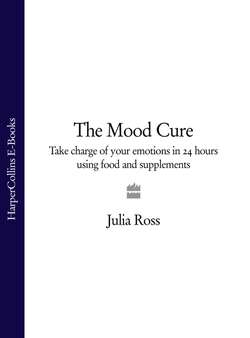Читать книгу The Mood Cure: Take Charge of Your Emotions in 24 Hours Using Food and Supplements - Julia Ross - Страница 5
Foreword
ОглавлениеWe certainly need a Mood Cure in the United States, but do you need one in the United Kingdom? Let’s compare the emotional facts of life in the U.S. with those in the U.K. They’re similar, but there are some interesting differences.
U.S. rates of depression and anxiety have tripled in the past ten years, with more than one in five adults now affected. The use of antidepressants is increasing so rapidly among both adults and children that Prozac (Fluoxetine) has become one of the ten top-selling drugs in the country.
How does the mood climate in the U.K. compare? According to the World Health Organization, depression is the second most common disability, after heart disease, throughout Europe, including the U.K., just as it is in the U.S. Within the U.K. itself, more than one in six adults were found to be either depressed, anxious, or both, in a large government survey published in 2001. As a result, Britons are also using antidepressants routinely, but not at quite the U.S. rate. In 2000, Fluoxetine became the seventeenth largest selling drug in the country and Efexor the eighteenth.
What accounts for the British having a serious, but somewhat less alarming, incidence of mood malaise than we have in the U.S.? There are three major factors at work here: food quality, exercise frequency, and access to bright sunlight. The food quality in the U.K. is slightly superior to that in the U.S., with more fresh food and less packaged food eaten, though that quality is steadily declining as it follows U.S. trends. On the other hand, British weather is much worse and Britons are almost as sedentary as Americans. This means that the dietary advantage that you in Britain still have is partly counterbalanced by lack of sunlight and lack of exercise, so you must vigilantly safe-guard it.
The Mood Cure is intended to help you discover mood-healthy foods and avoid mood-toxic foods by learning from our Yankee mistakes. For example, as you read about the low-fat experiment that failed in the U.S., you can consider enjoying butter on your potatoes once again.
This book will also recommend some wonderfully helpful nutrient supplements. Take Vitamin D, for example. It can be a powerful mood enhancer and is especially critical for you in the U.K. because you don’t get enough sunlight to stimulate its natural production. In 2002 the results of a study on the use of supplements made headlines all over the U.K. In it two groups of prisoners in a maximum-security prison were given identical meals three times a day. One group was given vitamins, minerals and essential fats as supplements, including 800 IU’s of Vitamin D, the Sunshine Vitamin. The other group was given dummy capsules. Those given the supplements committed 40% fewer violent crimes than those who were not.
Our experience at the U.S. clinic that I run is similar to that of the clinicians who administered the U.K. prison study: we have observed that, even when people adopt a relatively nutritious diet (most Americans subsist on diets inferior to the prison diet in the U.K. study!), it’s often not enough to reverse the deeper nutrient deficiencies that can trigger feelings like irritability, depression, anxiety and stress. The use of therapeutic dietary supplements, for a few months, is usually critical for the effective relief of these kinds of mood problems.
If you decide that you’d like professional help in your mood repair project, you’re in the right country. Fortunately, as you’ll see in The Mood Cure’s Resource Section pages 289–348, Britain is rich in practitioners trained to use specific supplements and dietary strategies to eliminate mood problems. Antony Haynes, whose busy London Nutrition Clinic is regularly featured in the national media, Patrick Holford, author and founder of The Institute for Optimum Nutrition, and Amanda Geary, author and head of The Food and Mood Project are three of the leading figures in this field, but there are many other holistic nutritionists throughout the U.K. Many are members of the British Association of Nutritional Therapists, whose contact information you’ll find on page 290.
Unfortunately, the British public’s access to many mood-saving nutrient supplements is threatened in the European Union by two international directives in particular, operating under the umbrella of CODEX. These are the Food Supplement Directive and the Traditional Medicines Directive. Should these be passed as law, nutrients such as 5-HTP and herbs such as Saint-Johns wort would be under threat. These two supplements feed and stimulate the area of the brain that produces serotonin, our most important natural anti-depressant. As I explain in Chapter 3 the use of these two specific nutrients can be essential for those of you experiencing depression or anxiety and who are looking for an alternative to drugs like Fluoxetine.
I wish you all the best in your personal and collective attempts to retain your access to mood and health-vital supplements. I include, in the Resource Section, specific U.K. sources for the supplements I recommend in The Mood Cure. However I also refer to many resources in the U.S., so that you can be guaranteed of your Mood Cure no matter what local restrictions you may encounter.
